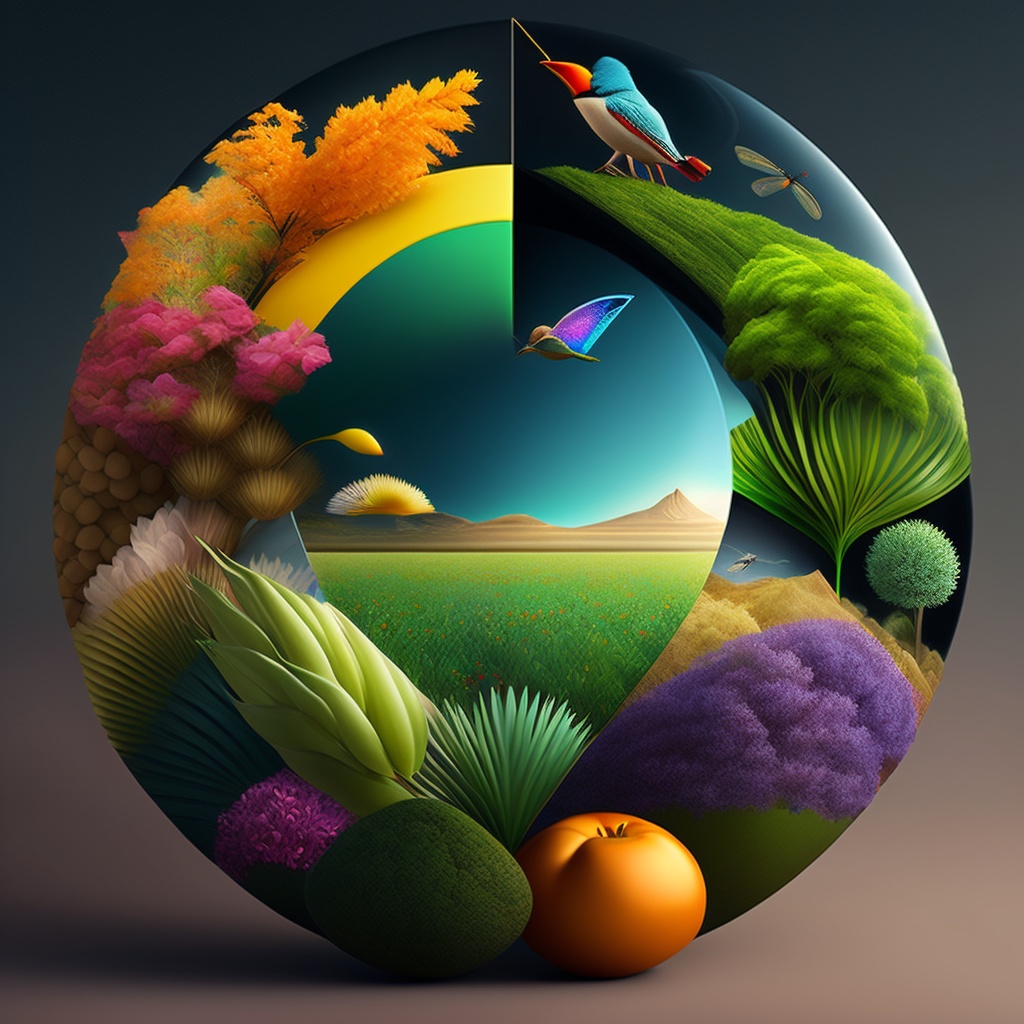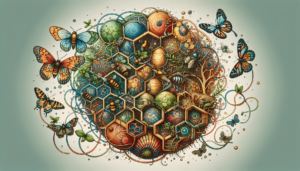Introduction
The importance of biodiversity is not just a topic for scientific debates or trendy social media hashtags—it’s the fundamental key to life as we know it. Forget what you’ve heard at posh dinner parties or read in dense academic journals. This term is not ornamental; it’s absolutely vital.
Let’s set the stage: Biodiversity means more than just the number of species on Earth. It’s about the intricate relationships that make life sustainable. It touches you in ways you might not even realize, impacting everything from the food on your plate to the air you breathe.
Still not convinced you should care? Stick around. We’re about to dive headfirst into a world where the importance of biodiversity is far more than a catchy phrase—it’s the very fabric of our existence. Prepare for a ride through the complexities and wonders that make our planet habitable and uniquely diverse.
The Variety of Life
Plants and Animals
Imagine a world where the only ice cream flavor is vanilla. Boring, right? Similarly, a world without the vibrant diversity of plants and animals would be like eating a never-ending plate of plain toast. From towering trees to tiny ants, our planet’s rich tapestry of life forms is not just about aesthetics; it’s about balance and functionality.
Microbes and Insects
Even the tiny creatures we often overlook (and sometimes squash) play a vital role in the importance of biodiversity. They’re like that underrated side character in your favorite sitcom – they add flavor to the story! Microbes break down waste, help in digestion, and even battle diseases. Insects pollinate flowers and serve as an essential food source for many species. So next time you see a bug, say thanks!
Genetic Diversity
DNA, it’s not just a science-y word; it’s what makes you, you, and me, well, a great writer. Genetic diversity is like having multiple shades of the same color in a painting – it adds depth and beauty. It’s what makes us resilient as a species and allows us to adapt and evolve. Imagine having the same password for every online account. Easy to hack, right? Gene
tic diversity keeps life’s code secure.
Biodiversity’s Impact on Ecosystems
Balancing the Food Chain
The food chain is like a game of Jenga; everything is intricately connected, and one wrong move could cause the whole tower to fall. Each organism, from the mighty predator to the humble herbivore, plays a crucial role and cements the importance of biodiversity. Take one out, and the system could collapse. Like a quirky band where each musician plays their part, the food chain’s harmony ensures that populations remain stable, preventing the overgrowth of certain species and the extinction of others. You wouldn’t want to live in a world overrun by mosquitoes, would you?
Climate Control
Plants are more than just decorative ornaments; they’re Earth’s air conditioning system. They absorb carbon dioxide, our planet’s most notorious greenhouse gas, and release oxygen, the stuff we breathe. It’s a win-win! Oceans and forests act like sponges, soaking up the heat and regulating the Earth’s temperature. Remember that sweaty guy at the gym who forgot his towel? That’s the Earth without its green cover! Preserving our natural landscapes helps prevent extreme weather changes, keeping Mother Earth comfy and cool.
Ecosystem Services
Ecosystem services are like those working behind the scenes in your favorite movie; you don’t always notice them, but they’re vital. These include:
– Water Purification: Wetlands act like a massive Brita filter, cleaning and purifying our water. Who knew swampy marshes could be so chic?
– Soil Fertility: Worms, bacteria, and other soil critters help in breaking down organic matter, replenishing the soil with nutrients. It’s like a never-ending buffet for plants!
– Pollination: Bees, butterflies, and even some birds help in pollinating flowers, ensuring that plants reproduce. It’s like a dating service for flowers, but way more efficient!
– Disease Regulation: Biodiversity helps in controlling the spread of diseases. Various species act as buffers, preventing pathogens from reaching humans. Think of it as an immune system for the planet.
– Carbon Sequestration: Forests and oceans not only absorb CO2 but also store it, keeping it out of the atmosphere. It’s like a storage locker for unwanted greenhouse gases, only way bigger!
– Mental Well-being: Ever felt a sense of calm in a lush garden or a vibrant forest? Nature’s beauty provides therapeutic benefits, acting like a spa for your mind. Ahh, relaxation!
Biodiversity’s impact on ecosystems is like a well-oiled machine where each part plays its role. It provides essential services, balances life, regulates climate and adds a touch of beauty to our world. It’s more than just science; it’s the art of life, a symphony played by a multitude of species. Now, isn’t that something worth preserving?
Why Should We Protect Biodiversity?
The Ethical Perspective
Humans have built skyscrapers, sent robots to Mars, and invented self-cleaning vacuums. But does that give us the right to decide the fate of other life forms? Here’s where ethics come in:
– Respect for All Life: Just as we don’t choose our family members, we don’t choose our planetary companions either. From majestic elephants to tiny microbes, all deserve respect and protection.
– Interconnectedness of Life: Ever tried pulling a single thread from a knitted sweater? It affects the whole thing! Similarly, every species is connected, and harming one can affect others. It’s a cosmic web, and we’re all in it together!
Economic Importance
Biodiversity isn’t just about saving cute animals; it’s about cold, hard cash! Here’s how:
– Medicine: Approximately 50% of pharmaceutical drugs are derived from plants, animals, and microorganisms. Without biodiversity, our medicine cabinets would look emptier than a teenager’s fridge.
– Agriculture: Crops rely on a variety of insects for pollination and healthy soil for growth. Without biodiversity, we might end up with an all-brussels-sprouts diet. And nobody wants that!
– Tourism: Ever traveled to see exotic wildlife or lush landscapes? That’s biodiversity fueling the tourism industry. It’s not just about the selfies; it’s about economic growth!
Aesthetic Value
Let’s face it; nature is downright gorgeous! And there’s more to it:
– Inspiration for Art and Culture: Countless paintings, songs, and dances are inspired by nature’s beauty. Without biodiversity, our cultural palette would be as bland as plain tofu.
– Recreational Activities: Hiking, bird-watching, or just lying on the grass watching clouds – it’s all thanks to biodiversity. It’s like a never-ending amusement park, and the entrance is free!
– Spiritual Connection: Many find a spiritual connection with nature. Trees, rivers, and mountains are sacred in various cultures. It’s more than scenery; it’s a soulful connection.
Biodiversity for Survival
Here’s the kicker: We need biodiversity for our survival!
– Resilience to Changes: A diverse ecosystem is like having a diversified stock portfolio; it’s more resilient. A variety of species ensures that life continues, even if some elements fail.
– Potential Solutions to Future Problems: Ever heard of the saying, “Don’t put all your eggs in one basket”? Biodiversity is like having an assortment of eggs, each potentially holding solutions to future diseases, food shortages, or environmental challenges.
– Health and Well-being: A rich natural environment has been shown to reduce stress and promote physical well-being. Think of it as a gym membership from Mother Nature, and she’s not even charging you!
In a nutshell, protecting biodiversity is like safeguarding a treasure trove that feeds our souls, fills our wallets, and ensures our very survival. It’s more than just a moral duty; it’s a practical, economical, and utterly beautiful necessity. Who knew that something as simple as a frog in a pond could mean so much? But hey, that’s the magic of biodiversity for you!
How to Protect Biodiversity
Educate Yourself and Others
Knowledge is power, and in this case, it can be the power to save our planet:
- Read and Research: Start with understanding the value and importance of biodiversity in your region. Grab books, click articles, or even watch documentaries. Turn your curiosity into a superpower!
- Spread the Word: Share what you’ve learned with friends, family, and even your social media followers. Who knew saving the planet could earn you likes and retweets?
- Join Environmental Clubs: Sometimes, it’s a team sport. Join local clubs and organizations. It’s like being in a sports league, but with more trees and fewer tophies.
Support Sustainable Practices
Your shopping choices matter:
- Buy Organic and Local: These products often support farming methods that are less harmful to the environment. Plus, they’re like a culinary hug for your taste buds.
- Reduce, Reuse, Recycle: The three R’s aren’t just catchy; they’re a roadmap to sustainability. Think of it as giving your trash a second chance at stardom.
- Sustainable Tourism: Even your vacation choices can make a difference. Look for eco-friendly travel options. It’s like a VIP pass to nature’s most exclusive venues.
Get Involved with Conservation Efforts
Roll up those sleeves; it’s time to get hands-on:
- Volunteer: Many local organizations would love your help. Plant trees, clean rivers, or adopt a highway. It’s like going to the gym, but with more soulful rewards.
- Donate: Money can’t buy happiness, but it can protect endangered species. Find trustworthy organizations and become a part of their mission.
- Advocate for Stronger Policies: Write to your local representatives, sign petitions, and vote for measures that protect biodiversity. It’s like a love letter to Mother Earth.
Create a Friendly Environment in Your Community
Your backyard can be a flagship for the importance of biodiversity:
- Plant Native Species: These plants are like the hometown heroes of your garden, supporting local insects and birds.
- Build Habitats: Birdhouses, bat boxes, and bee hotels. It’s like opening a bed-and-breakfast for your winged neighbors.
- Avoid Harmful Chemicals: Pesticides may kill bugs, but they also harm other creatures. It’s like setting a mousetrap and catching your toes. Ouch!
Collaborate with Scientists and Researchers
Sometimes, saving the planet needs a little professional help:
- Citizen Science Projects: Join research projects that require public participation. It’s like being a detective but with more butterflies and fewer trench coats.
- Support Scientific Research: Whether it’s through funding or advocacy, supporting scientific work is like investing in a brighter future.
Embrace a Biodiversity-Friendly Lifestyle
Every little change counts:
- Conserve Water and Energy: Turning off taps and lights when not in use is like giving Earth a gentle pat on the back.
- Eat Responsibly: Reducing meat consumption or choosing sustainable seafood is like having a diet plan that the planet applauds.
- Travel Thoughtfully: Walk, bike, or use public transport. It’s not just eco-friendly; it’s a chance to admire the scenery.
In essence, maintaining the importance of biodiversity is not just the job of scientists and policy-makers; it’s a shared responsibility. It’s like a community potluck, and everyone’s invited to bring something to the table. From daily choices to significant actions, protecting the importance of biodiversity can become a part of who we are. And hey, who knew saving the planet could be so much fun?
Climate Change and Biodiversity
Climate change isn’t just about melting ice caps; it’s reshaping the face and enhancing the importance of biodiversity:
- Shifting Habitats: As temperatures rise, plants and animals may find their current habitats inhospitable. It’s like being forced to move but without the helpful moving vans.
- Threats to Coral Reefs: Coral reefs are like underwater cities, teeming with life. Climate change could turn them into ghost towns.
- Changes in Migration Patterns: Birds and other migratory animals might get utterly confused. It’s like your GPS constantly rerouting you on a road trip.
- Increased Extreme Weather Events: More hurricanes, droughts, and floods mean more challenges for ecosystems. Mother Nature might be throwing a tantrum, and biodiversity bears the brunt.
Technological Advancements and Biodiversity
Technology isn’t just for binge-watching your favorite shows; it can be a game-changer for biodiversity:
- Gene Editing and Conservation: Scientists can use CRISPR and other tools to aid endangered species. It’s like giving nature a helping hand with a high-tech twist.
- Remote Monitoring: Drones and satellites can monitor ecosystems and wildlife. It’s like having a security camera, but for the entire planet.
- Virtual Education: Virtual reality and online platforms can educate people about biodiversity from the comfort of their homes. Imagine a virtual safari right in your living room!
Urbanization and Its Impact
As cities expand, biodiversity needs to adapt:
- Loss of Habitats: More buildings mean less space for nature. It’s like a never-ending game of musical chairs, and plants and animals are losing their spots.
- Urban Biodiversity Opportunities: Creating green spaces in cities, like parks and rooftop gardens. It’s a concrete jungle out there, but who says it can’t be green?
- Sustainable Urban Planning: Integrating biodiversity into city planning is like baking a cake and adding hidden veggies. It’s good for you, and you barely notice the difference!
Global Cooperation for Biodiversity Protection
It’s a small world, after all, and saving biodiversity needs teamwork:
- International Agreements and Policies: Countries working together to protect biodiversity is like a group project where everyone actually contributes.
- Sharing Knowledge and Resources: Collaboration between scientists, governments, and organizations worldwide. It’s like a potluck dinner, but instead of casseroles, countries are bringing ideas.
- Public-Private Partnerships: Businesses and governments joining forces for conservation. It’s like a superhero team-up, but with more spreadsheets and fewer capes.
The Role of Individuals in Shaping the Future
Never underestimate your power to make a difference:
- Everyday Choices Matter: From what you eat to what you wear, your choices have ripple effects. You’re like the butterfly in the chaos theory but with less fluttering.
- Grassroots Movements: Communities coming together to protect local ecosystems. Think of it as a neighborhood watch but for plants and critters.
- Future Generations’ Education: Teaching children about biodiversity is like planting seeds for a greener future.
Conclusion
The importance of biodiversity isn’t just an academic or environmental buzzword; it’s a narrative in which we all are crucial characters. Do we want to be villains in a tale of ecological destruction or heroes in a saga of environmental restoration and balance? This is our collective choose-your-own-adventure, and the pen is firmly in our hands.
Our choices are vital. From the technologies we adopt to the policies we support and the day-to-day decisions we make, every action plays a role in shaping this global story. The road ahead is undeniably complex, filled with both promise and pitfalls. Yet, that’s precisely what makes this journey worthwhile. The challenges provide opportunities for innovation, resilience, and ultimately, a harmonious existence with the natural world.
So, whether you’re inspired by the sheer beauty of nature, motivated by economic reasons, or driven by a moral obligation to future generations, remember that your actions have ripple effects. Through collaboration, informed choices, and a shared vision, we can make the importance of biodiversity a cornerstone for a thriving, sustainable future for all.
FAQs
What are some examples of biodiversity?
When we talk about biodiversity, we’re not just referring to exotic species in far-off lands. Think about the array of plants in a local park, the myriad of insects in your backyard, or even the genetic diversity within a community of house cats. These all constitute examples that demonstrate the importance of biodiversity in everyday life.
Is biodiversity under threat?
Unfortunately, yes. Human activities like deforestation, pollution, and overfishing are putting biodiversity at risk. But before you sink into despair, remember that your actions can make a difference. Through collective efforts, we can mitigate these threats and protect our planet’s rich biological tapestry.
What’s the future of biodiversity?
The future of biodiversity is not set in stone; it’s shaped by our collective decisions. With the right investments in scientific research, a commitment to education, and active participation from individuals, communities, and nations, we can steer the story towards a happy ending. But the effort starts at the grassroots—with you.
Why is biodiversity important?
You may think biodiversity is important for its own sake—and it is—but it also provides practical benefits. From maintaining a balanced ecosystem that purifies air and water, to supporting economies via agriculture and tourism, the importance of biodiversity is multifaceted and far-reaching.
How can I contribute to protecting biodiversity?
Contributing to the protection of biodiversity doesn’t necessarily require grand gestures. Simple actions like reducing waste, planting native species in your garden, or even choosing sustainable products can have a significant impact. Don’t underestimate the power of community involvement or the value of advocating for meaningful policy changes, either. Your voice matters.




